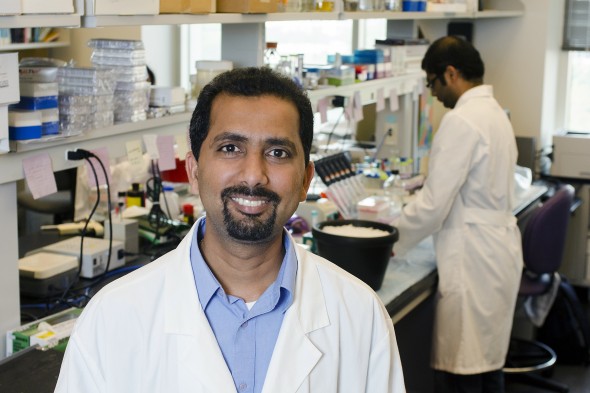UIC researcher receives fellowship to identify lung cancer biomarkers

Rama Kamesh Bikkavilli was named a 2014 A Breath of Hope Research Fellow. Photo: Joshua Clark/UIC Photo Services (select image to download)
Rama Kamesh Bikkavilli, assistant professor in pulmonary, critical care, sleep and allergy at the University of Illinois at Chicago College of Medicine, has been named a 2014 A Breath of Hope Research Fellow by the A Breath of Hope Lung Foundation. The fellowship includes a $150,000 grant to support lung cancer research.
Bikkavilli’s research focuses on the role of arginine methylation in driving the development of lung cancer.
Methylation is the bonding of a small molecule – a methyl group, composed of a carbon atom and three hydrogen atoms – to a much larger molecule, such as a protein or DNA. Methylation can change the shape of the larger molecule and how it functions, and it has been shown to be an important mechanism in regulating gene expression.
Arginine, one of the amino acid building blocks of proteins, bonds easily with a methyl group.
“There is mounting evidence that arginine methylation is important in many cancers, including lung cancer,” says Bikkavilli, who is also a member of the University of Illinois Cancer Center. “Drugs that interfere with or target arginine methylation may represent a whole new class of therapies to treat cancer.”
Bikkavilli is looking at methylation of two proteins, called ILF2 and ILF3, catalyzed by an enzyme called protein arginine methyl transferase 1, or PRMT1. His previous work showed that levels of PRMT1, as well as levels of ILF2, were elevated in lung cancer cells compared to healthy lung cells. When PRMT1 is removed from cancer cells, their growth and proliferation is significantly reduced, suggesting that the enzyme is involved in causing the rapid cell growth and division that leads to tumors.
Bikkavilli already knows that PRMT1 methylates ILF2, and he has some evidence that it also methylates ILF3. Together, these two proteins form a complex that acts as a transcription factor to down-regulate the production of a powerful tumor suppressor.
Bikkavilli will use the fellowship award to further investigate the effects of ILF2 and ILF3 methylation by PRMT1. He wants to know whether methylation is required to bring ILF2 and ILF3 together to form the transcription factor and if patterns of methylation on ILF2 and ILF3 can be used as a biomarker for lung cancer.
“If we know the arginine methylation profiles in lung cancer cells, then we might be able to look for those patterns as a way of assessing risk for developing lung cancer,” he said.
